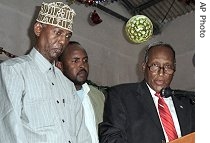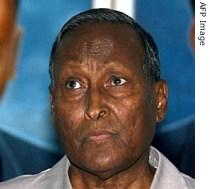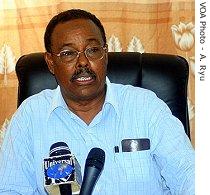-
(单词翻译:双击或拖选)
Nairobi
18 July 2007
In the Somali capital, Mogadishu, insurgent1 violence is continuing to cause delays in the start of peace talks to end 16 years of factional strife2. As VOA Correspondent Alisha Ryu reports from our East Africa Bureau in Nairobi, the reconciliation3 process is also being severely4 tested by increasing criticisms about the performance of Somalia's top interim5 government leaders and allegations that they are pursuing their own agendas.
When Somalia's Ethiopian-backed, secular6, interim government took power in Mogadishu from Islamists more than six months ago, major western donor7 nations urged the government to hold a national reconciliation conference that could help stabilize8 the country, help heal the wounds of civil war, and pave the way for nation-wide elections in 2009.
But organizing and holding that conference has not been an easy task for Somalia's Transitional Federal Government, which was established in 2004 in neighboring Kenya, and represents the 14th attempt by the international community to form a functioning government in Somalia since the fall of Mohamed Siad Barre's regime in 1991.
Insurgents9, who began a fierce guerrilla war against the government in February, have played a key role by disrupting the planned peace conference four times in as many months.
 |
| Abdullahi Yusuf, (r), during opening of the peace conference in Mogadishu, 15 July 2007 |
Ali Abdullahi is a Nairobi-based, pro-interim government Somali intellectual, who is becoming increasingly concerned that insurgents, not the government, are winning the hearts and minds of ordinary Somalis.
Abdullahi says he and many of his colleagues believe the government is having trouble uniting Somalis behind it, largely because it is seen as being beholden to the country's traditional rival in the Horn, Ethiopia. Ethiopia's military brought the interim government to power and tens of thousands of troops are still in Somalia to protect it.
"The biggest challenge is the Ethiopian presence in Somalia," said Abdullahi. "They need to be replaced constructively11 by African Union [AU] forces. The time frame should be as quickly as possible."
Islamist leaders exiled in Eritrea, and whose followers12 make up a large number of the insurgents, have rejected participating in any peace conference with interim government officials while Ethiopian troops were still in Somalia.
They say that they would consider joining the talks if the Ethiopians withdrew, and if the reconciliation process included formulating13 power-sharing deals with not just rival clans14, but with political rivals, like the ousted16 Islamic Courts Union.
The director of the Nelson Institute for International and Public Affairs at James Madison University in the United States, J. Peter Pham, says he believes if the government showed a willingness to be politically inclusive, the insurgency17 could weaken significantly.
 |
| Somali President Abdullahi Yusuf |
"The groundwork was never laid for this conference, which leads me to question whether the political will was ever there for the conference to succeed," said Pham.
"They have shown very little political will to be inclusive. The international community needs to wake up and recognize that the TFG was seriously flawed from the start because it did not have the requisites18 to build legitimacy19 across clan15, religious, and ideological20 lines," he continued.
Pham notes that, in Mogadishu, clan tensions have skyrocketed in recent months amid allegations that President Yusuf is encouraging his Darod clan's attempts to claim dominancy in the capital over Prime Minister Gedi's Hawiye clan.
The Hawiye clan is also reportedly dividing quickly along sub-clan lines, making reconciliation more difficult.
Somalis say a particularly dangerous power struggle is brewing21 between the Abgal clan and the Habre Gedir clan.
 |
| The chairman of Somalia's reconciliation committee, Ali Mahdi Mohamed, 13 Jun 2007 |
When Prime Minister Gedi recently appointed Ali Mahdi, a fellow Abgal, to be the chairman of the national reconciliation committee, many Somalis, especially within the Habre Gedir clan, complained bitterly that the committee was not a neutral, independent body.
A member of the Somali interim parliament, Awad Ashureh, acknowledges that the interim government has failed to achieve much of what it had promised to do, when it was formed nearly three years ago. He says the parliament, which has the power to vote the president and the prime minister out of office, will act, if necessary, to stabilize the country.
There are mistakes and it is the jurisdiction24 of the parliament to review and correct all mistakes and mismanagement.
Analyst25 J. Peter Pham says he believes western donor nations must set clear political benchmarks for Somalia's interim government to meet.
"Instead of constantly advancing money for these conferences, I think benchmarks for progress need to be laid, and if there is failure to adhere to those benchmarks, then gradual derecognition of the TFG Without international recognition, the TFG would simply dissolve," said Pham.
Few experts believe the international community would allow the Transitional Federal Government to collapse26 for fear it would create a vacuum for Islamic radical27 groups like al-Qaida to fill.
But they warn that not holding interim leaders accountable for failing to bring peace and stability could also lead desperate Somalis into the arms of radical Islamists.
 收听单词发音
收听单词发音
1
insurgent

|
|
| adj.叛乱的,起事的;n.叛乱分子 | |
参考例句: |
|
|
|
2
strife

|
|
| n.争吵,冲突,倾轧,竞争 | |
参考例句: |
|
|
|
3
reconciliation

|
|
| n.和解,和谐,一致 | |
参考例句: |
|
|
|
4
severely

|
|
| adv.严格地;严厉地;非常恶劣地 | |
参考例句: |
|
|
|
5
interim

|
|
| adj.暂时的,临时的;n.间歇,过渡期间 | |
参考例句: |
|
|
|
6
secular

|
|
| n.牧师,凡人;adj.世俗的,现世的,不朽的 | |
参考例句: |
|
|
|
7
donor

|
|
| n.捐献者;赠送人;(组织、器官等的)供体 | |
参考例句: |
|
|
|
8
stabilize

|
|
| vt.(使)稳定,使稳固,使稳定平衡;vi.稳定 | |
参考例句: |
|
|
|
9
insurgents

|
|
| n.起义,暴动,造反( insurgent的名词复数 ) | |
参考例句: |
|
|
|
10
mortar

|
|
| n.灰浆,灰泥;迫击炮;v.把…用灰浆涂接合 | |
参考例句: |
|
|
|
11
constructively

|
|
| ad.有益的,积极的 | |
参考例句: |
|
|
|
12
followers

|
|
| 追随者( follower的名词复数 ); 用户; 契据的附面; 从动件 | |
参考例句: |
|
|
|
13
formulating

|
|
| v.构想出( formulate的现在分词 );规划;确切地阐述;用公式表示 | |
参考例句: |
|
|
|
14
clans

|
|
| 宗族( clan的名词复数 ); 氏族; 庞大的家族; 宗派 | |
参考例句: |
|
|
|
15
clan

|
|
| n.氏族,部落,宗族,家族,宗派 | |
参考例句: |
|
|
|
16
ousted

|
|
| 驱逐( oust的过去式和过去分词 ); 革职; 罢黜; 剥夺 | |
参考例句: |
|
|
|
17
insurgency

|
|
| n.起义;暴动;叛变 | |
参考例句: |
|
|
|
18
requisites

|
|
| n.必要的事物( requisite的名词复数 ) | |
参考例句: |
|
|
|
19
legitimacy

|
|
| n.合法,正当 | |
参考例句: |
|
|
|
20
ideological

|
|
| a.意识形态的 | |
参考例句: |
|
|
|
21
brewing

|
|
| n. 酿造, 一次酿造的量 动词brew的现在分词形式 | |
参考例句: |
|
|
|
22
overthrow

|
|
| v.推翻,打倒,颠覆;n.推翻,瓦解,颠覆 | |
参考例句: |
|
|
|
23
devastating

|
|
| adj.毁灭性的,令人震惊的,强有力的 | |
参考例句: |
|
|
|
24
jurisdiction

|
|
| n.司法权,审判权,管辖权,控制权 | |
参考例句: |
|
|
|
25
analyst

|
|
| n.分析家,化验员;心理分析学家 | |
参考例句: |
|
|
|
26
collapse

|
|
| vi.累倒;昏倒;倒塌;塌陷 | |
参考例句: |
|
|
|
27
radical

|
|
| n.激进份子,原子团,根号;adj.根本的,激进的,彻底的 | |
参考例句: |
|
|
|















